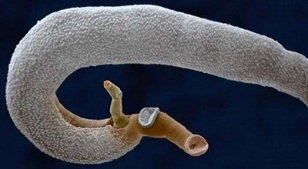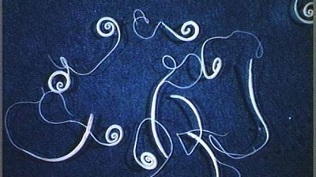Helminths are parasitic worms. To do this, they use intermediate and primary hosts, feeding on cells or tissues, absorbing nutrients and vitamins entering the body for the host. Worms in the human stomach, as well as in the intestine or other tissue structures, during their vital activity poison the body with toxic substances.
Types of parasites that enter the body through the stomach
Each type of parasite can develop in its inherent part of the human body, where the best conditions for its reproduction and nutrition are created. Some types of parasites can move around the body from one organ to another. Infection with parasites occurs in different ways. The most common means of parasite entry into the human body is through food. Problems can be avoided by following basic hygiene rules - washing hands before eating and handling food carefully.
Parasites do not live long in the human stomach due to the effect of hydrochloric acid on their membrane. The most common exotic microorganisms that parasitize the human body are:
- Ascaris- have the ability to move through the ducts of the hepatic and pulmonary structures, entering the intestines. In the small intestine, roundworms develop into sexually mature individuals.
- Schistosomes- affect the liver tissue, in advanced cases, causing the development of oncological diseases and dystrophy of the hepatobiliary system.
- Hookworms- cause digestive tract disorders. Hookworms and necators are the most dangerous for the human body. Localization of parasites mainly in the area of the duodenum. Hookworms can enter the human body not only through the stomach. Parasites have the ability to invade the skin, causing allergic reactions in the form of itching, burning and redness.
- Toxoplasmasare the simplest parasites that often affect the human body. The disease progresses quite easily, often imperceptibly to humans. Serious consequences for the body arise only with severely weakened immunity.
- Large tapeworm- localized in the small part of the human intestine. It can reach several meters in length. The parasite causes the development of a deficiency in the body of cyanocobalamin (vitamin B12), as well as of folic acid. Toxic allergic reactions of the body are not excluded. Infection occurs when eating fish with larvae. The
- bovine tapewormis a worm that causes the development of a disease such as tapeworm. Entering the human body through food, the bovine tapeworm parasite passes through the stomach, where it sheds the membrane under the action of gastric juice. Its suction cups are released and the parasite can easily attach itself to the mucous membranes of the small intestine. Signs of a bovine tapeworm in the body are abdominal pain, nausea, and a rash of the stomach contents. The patient loses his appetite, may suffer from dyspeptic disorders (belching, for example). In some cases, bovine chain infection is a manifestation of allergic skin reactions in the form of urticaria. The
- Pork tapewormis a helminth up to 10 meters in diameter. It belongs to one of the biggest worms that infect the human body. Passing through the stomach, the eggs of the parasite, under the action of hydrochloric acid, lose their shell. The larvae emerging from the egg spread through all tissues of the human body, causing the development of cysticercosis. Cysticercosis represents the greatest danger to the nervous system.
- Vlasoglavis a roundworm that causes the disease of trichocephalosis. Symptoms of invasion may be absent for a long time. In complicated cases, with a large accumulation of parasites, signs of ulcerative colitis or Crohn's disease may appear. The abdomen hurts, appetite decreases, and stool becomes watery. In the stool, streaks of blood and mucus are noted.


Symptoms of parasites and worms in the gastrointestinal tract
Alien organisms leading a parasitic lifestyle in the body of their host disrupt the functioning of many organs, causing inflammatory processes and severely destroying body tissue.
Parasites in the intestinal tract for their development and reproduction use nutrients from food intended for the host. The consequences for humans are sad. The body experiences a serious deficiency of trace elements and vitamin complexes.
Children's organisms are the most at risk.
Against the background of severe helminthiasis, the normal growth and development processes, both physically and psychologically, are seriously disturbed. Helminths have the ability to adapt perfectly and live for decades in the host's body. Helminth eggs have a pronounced resistance to environmental factors.
Being in the digestive tract, various types of helminthiasis can disrupt the digestive process by releasing specific toxic substances for their protection, inactivating enzymatic activity. Helminthiasis can cause gastritis and other dyspeptic disorders.
The symptoms that appear during infection with parasites can be very different in their manifestations. In the vast majority of clinical cases, discomfort and painful sensations are observed at the location of the parasites. So, helminths, the habitat of which is the skin, damage the dermis, which leads to the appearance of allergic reactions. Parasites localized in the structures of the lungs can cause a disturbing cough or shortness of breath. Symptoms of dwarf tapeworm infection are manifested by weakness throughout the body, memory impairment, pain in the abdomen and head. Sometimes constant nausea and vomiting is diagnosed, such as with a stomach ulcer.
Stool disturbances, bad breath, painful sensations in the intestines or digestive disturbances, in most cases, are associated with the action of parasites in the digestive tract.
The effect of foreign microorganisms on the human body as a whole leads to the following symptoms:
- increased weakness;
- headache attacks;
- insomnia;
- bloating;
- rash and itching on the skin of an allergic nature;
- attacks of bronchial asthma.
In addition, the overall resistance of the body decreases, against the background of changes in the functioning of the immune system. In young children, helminthiasis is manifested by delayed physical and psychological development.
Diagnostics
Diagnostics combines studies to identify larvae or eggs of worms.
Biological materials for diagnosis are:
- excrement;
- urine;
- sputum;
- content of the duodenum;
- secretion from the bile ducts;
- rectal scrapings;
- smear from the perianal space;
- muscle fibers;
- blood.
Since helminths and their particles are detected by a macroscopic method, eggs and larvae can only be detected by laboratory examination under a microscope.
The acute phase of helminthiasis caused by parasites in the tissues or by larvae of parasitic forms of toxocariasis, trichinosis, cystocerciasis, trichocephallosis, involves the use of serological samples, such as:
- RSK- complement binding reaction;
- HA- indirect agglutination;
- ELISA- immunofluorescence analysis;
- AHL- lysis agglutination.
In some cases of helminthiasis, a reliable diagnosis can only be made with the help of special ultrasound examinations, computed tomography, x-ray examination and endobiopsy.
Processing
The treatment for helminthiasis can vary widely. Science knows more than 300 all kinds of helminthiasis, but the main parasites causing the changes and systemic intoxication are round and flatworms. They are generally divided into intestinal and non-intestinal. When prescribing therapeutic measures, it is important to take into account a number of characteristics inherent only in a certain class of helminths harmful to human health.
In order to get rid of helminths, a specialist prescribes a comprehensive treatment regimen, and it is important to take into account the factors of the frequency of infection of certain organs, the intensity of infection, the level ofintoxication and duration of helminths. This allows you to prescribe the most effective means.
Drugs
To combat the type of helminth diagnosed, an individual treatment regimen is being developed. The specialist prescribes the appropriate drug based on the patient's test results.
Folk remedies
Traditional medicine can help get rid of parasites at home.
For the treatment of helminthiasis, you can use the following recipes:
- The
- wormwood seed inflorescences,must be crushed and mixed with honey. Take the drug 3 days in a row 3 times a day, 1 teaspoon. Effective for ascariasis.
- Infusion of bitter wormwoodis prepared as follows - grind the grass, pour boiling water over it, let it brew overnight. In the morning, filter the infusion and drink it 3 times a day. The duration of treatment can be up to 3 weeks. Effective for ascariasis and enterobiosis.
- Pumpkin seeds.They can be used raw, dried or powdered. The powder is mixed with honey, and the drug is taken on an empty stomach. Copes with tape worms. You can make a decoction of pumpkin seeds. One pound of seeds is crushed in a mortar, poured with 1. 5 liters of hot water and placed in a water bath. It is not necessary to bring to a boil. Drink the broth on an empty stomach.
- Infusion of pomegranate peels.Dried and crushed pomegranate peels, pour boiling water, cool and take 1 teaspoon 3-4 times a day. The course of therapy is 7 days.
Preventive measures
If the rules of personal hygiene are not observed, the parasites will have to be constantly removed from the body, which will have a detrimental effect on the condition of the body as a whole.
For the purposes of prevention, it is important to observe the following points of basic hygiene rules:
- avoid close contact with animals;
- keep your hands clean - wash them after every ride;
- it is important to keep the living room clean, to do a wet cleaning, to wash the dishes with detergents;
- if there are children in the house, it is recommended to wash children's toys with soap, especially after a walk;
- wash vegetables and fruits under running water, preferably lukewarm or even hot, as the eggs of the worms have a sticky substance that prevents them from separating from the surface;
- eat meat and fish products only after preliminary heat treatment;
- drink clean water, avoid tap water as it may contain lamblia and schistosomes.
Helminthiasis not only cause discomfort, but also greatly harm the human body. Neglected cases of helminth damage lead to disturbances in the functioning of the whole organism. It is important to take timely preventive measures to avoid infection.




























